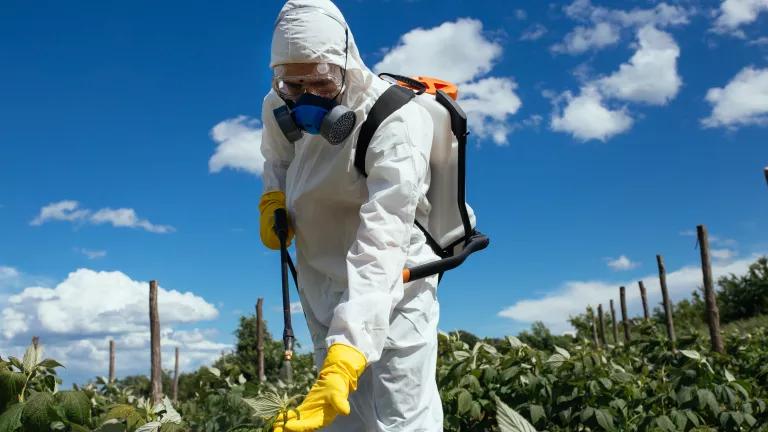What Would a Monsanto–Bayer Merger Really Grow?
It would boost our dependence on pesticides, seed costs for small farmers, grocery bills for American families, and population losses for butterflies and bees.

A megamerger between two of the world’s biggest agricultural corporations looms on the horizon. The seed and pesticide giant Monsanto is inching closer to uniting with the German pharmaceutical and chemical company Bayer—a consolidation that could spell disaster for farmers, pollinators, and affordable, healthy food.
Here’s why the Monsanto–Bayer merger is a toxic relationship:
One-Stop Shopping for Increased Pesticide Use
When the same people who sell seeds for pesticide-resistant crops also make the pesticides, there’s a huge incentive for that company to encourage chemical-heavy growing practices, cashing in twice on farmers who become ever more dependent on its products. And when pests and weeds inevitably develop a resistance to those chemicals? More seeds. More pesticides.
If the merger gets the green light, the result is a megacorporation, not a recipe for competition and innovation. In the past, such monopolies have cost small farmers big-time. Take corn, for example. As the likes of Monsanto and other big ag companies gobbled up smaller seed sellers in recent decades, the cost of corn seed nearly quadrupled while corn prices are roughly the same as they were in 1996.
Bad News for Bees and Butterflies
As you likely know, pollinators are in trouble. Bees are dying off in record numbers (without them, our crops would take a serious hit) and monarch butterfly numbers have dropped nearly 90 percent in just the past two decades. While climate change and habitat loss are contributing to these declines, we can also point a finger at neonics and glyphosate—two types of pesticides commonly found in Bayer and Monsanto products. Americans are spraying more and more of these toxins on crops and lawns—we used 3.5 million pounds of neonics in 2011 alone (double the amount used just five years earlier)—and pollinators are paying the price.
Our Wallets Could Also Be Taking a Hit, Along With Our Health
As farmers pay more for seeds and Monsanto–Bayer rakes in more cash, American families could be forking over more money at the grocery store. One in eight families in the United States already struggle to put dinner on the table, and climate change threatens to disrupt food production worldwide. Further, the World Health Organization classifies glyphosate, the widely used herbicide found in Monsanto’s Roundup, as a probable carcinogen, and increasing its use would only put more fieldworkers, consumers, and those living near farms at risk.
In these challenging times, we need a more diverse marketplace—one that values public health, the environment, and the rights of farmers—to spur innovation and encourage resilient food supplies. What we don’t need is a megacorporation with the power (and the financial incentive) to lock in a food system that douses our food and soils with toxic chemicals.
This NRDC.org story is available for online republication by news media outlets or nonprofits under these conditions: The writer(s) must be credited with a byline; you must note prominently that the story was originally published by NRDC.org and link to the original; the story cannot be edited (beyond simple things such as grammar); you can’t resell the story in any form or grant republishing rights to other outlets; you can’t republish our material wholesale or automatically—you need to select stories individually; you can’t republish the photos or graphics on our site without specific permission; you should drop us a note to let us know when you’ve used one of our stories.

A Leader to Meet This Moment
How to Raise an Environmentalist
If You Care About Climate Change, Then You Care About the Farm Bill